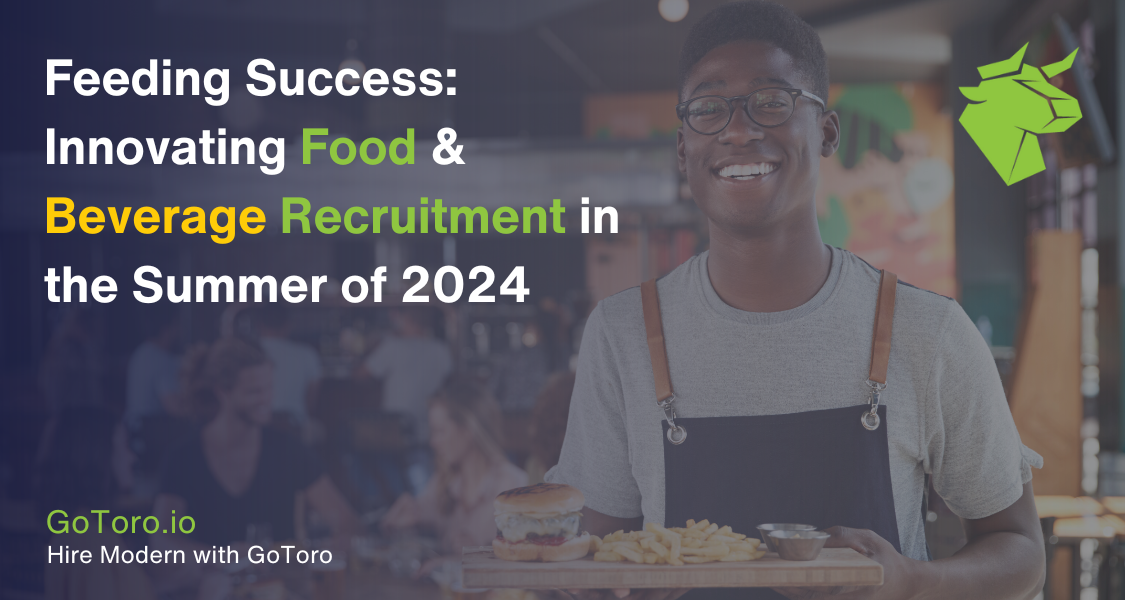Recruitment in the food and beverage industry plays a pivotal role in maintaining operational excellence, ensuring food safety, enhancing customer satisfaction, meeting industry demands, and driving business growth. As we navigate the summer of 2024, understanding and addressing the unique challenges of food and beverage hiring is essential for business success.
Importance of Recruitment in the Food and Beverage Industry

Maintaining Operational Excellence
Operational excellence in the food and beverage industry relies heavily on effective hiring practices. Recruiting skilled and dedicated employees ensures that all aspects of the business run smoothly, from food preparation to customer service. Consistent staffing levels allow businesses to maintain high standards of quality and efficiency, which are critical for success in this competitive industry.
Ensuring Food Safety
Food safety is a top priority for any food and beverage establishment. Hiring knowledgeable and trained staff is crucial to adhering to safety standards and regulations. Proper recruitment practices ensure that employees understand and implement food safety protocols, reducing the risk of contamination and ensuring the health and safety of customers.
Enhancing Customer Satisfaction
Customer satisfaction is directly linked to the quality of service provided by the staff. Effective food and beverage hiring practices help businesses recruit employees who are not only skilled but also passionate about delivering exceptional customer experiences. Happy, well-served customers are more likely to return and recommend the establishment to others, driving repeat business and brand loyalty.
Meeting Industry Demands
The food and beverage industry is constantly evolving, with changing consumer preferences and industry trends. To keep up with these demands, businesses must have a robust recruitment strategy in place. This involves hiring individuals who are adaptable, quick learners, and capable of meeting the dynamic needs of the industry. Effective recruitment ensures that businesses can stay ahead of the curve and meet market demands efficiently.
Driving Business Growth
Successful food and beverage hiring contributes significantly to business growth. By attracting and retaining top talent, businesses can expand their operations, introduce new services, and improve overall performance. Skilled employees bring innovation and efficiency, helping businesses to grow and thrive in a competitive market.
The Current Landscape of Food & Beverage Hiring
Overview of Current Trends and Statistics
The food and beverage hiring landscape is shaped by various trends and statistics that highlight the industry’s current state. As of 2024, there has been a noticeable shift towards digital recruitment methods, with many businesses leveraging online platforms and social media to attract candidates. The demand for temporary and seasonal workers has also increased, particularly during peak times such as summer.
Statistics indicate a growing skills gap in the industry, with many businesses struggling to find qualified candidates for specialized roles. Additionally, high turnover rates continue to be a challenge, emphasizing the need for effective retention strategies.
Impact of Recent Industry Changes on Recruitment Needs
Recent changes in the food and beverage industry have significantly impacted recruitment needs. The rise of technology, such as AI-driven recruitment tools and automation, has streamlined the hiring process, making it more efficient and targeted. Businesses are now able to reach a wider pool of candidates and make data-driven hiring decisions.
Moreover, the increased focus on sustainability and ethical practices has influenced recruitment, with businesses seeking employees who are aligned with these values. The COVID-19 pandemic has also left a lasting impact, prompting businesses to prioritize health and safety in their hiring practices and seek candidates who can adapt to new health protocols and changing business environments.
Overall, staying updated with these trends and understanding their impact on recruitment is crucial for businesses to develop effective hiring strategies and ensure they attract the best talent in the food and beverage industry.
Recruitment in the food and beverage industry faces several significant challenges. Addressing these challenges is crucial to ensure that businesses can attract and retain the talent necessary for their operations. Here, we explore the primary obstacles in food and beverage hiring.
High Turnover Rates
Frequent Employee Turnover and Its Impact
High turnover rates are a pervasive issue in food and beverage hiring. Frequent employee turnover disrupts operations, leading to increased training costs, reduced productivity, and inconsistent service quality. This constant cycle of hiring and training new employees can strain resources and negatively impact customer satisfaction.
Using the most recent data as of January 2024, the average annual restaurant industry turnover rate is 79.6% over the past 10 years (Toast, 2024)
Seasonal Demand Fluctuations

Increased Demand During Summer Months
Seasonal demand fluctuations, especially during the summer months, present a unique challenge for food and beverage hiring. The summer season typically sees a surge in customer activity, requiring businesses to scale up their workforce rapidly. Managing this increased demand is essential to maintain service levels and customer satisfaction.
Need for Temporary and Seasonal Staff
To address the spike in demand, businesses often rely on temporary and seasonal staff. However, recruiting and training these workers can be challenging. Ensuring that temporary employees are adequately prepared and integrated into the team is crucial for maintaining operational efficiency during peak times.
Skill Gaps
Shortage of Skilled Professionals in Specialized Roles
The food and beverage industry requires a diverse range of skills, from culinary expertise to front-of-house service. However, there is a noticeable shortage of skilled professionals, particularly in specialized roles. This skills gap can hinder business growth and service quality.
Positions Like Executive Chefs and Sommeliers
Positions such as executive chefs and sommeliers are particularly challenging to fill due to their specialized skill sets and high demand. These roles require extensive training and experience, making it difficult for businesses to find qualified candidates. Addressing this challenge involves targeted recruitment strategies and investment in training programs.
Regulatory Compliance
Ensuring Adherence to Industry Regulations and Standards
Regulatory compliance is a critical aspect of food and beverage hiring. Ensuring that all employees adhere to industry regulations and standards is essential for maintaining food safety and avoiding legal issues. This involves not only hiring individuals with the necessary knowledge and skills but also providing ongoing training and monitoring to ensure compliance.
Effective food and beverage hiring strategies must account for these key challenges. By understanding and addressing the issues of high turnover rates, seasonal demand fluctuations, skill gaps, and regulatory compliance, businesses can develop robust recruitment processes that attract and retain the talent they need to succeed.
Developing innovative recruitment strategies is essential for addressing the unique challenges in food and beverage hiring. Here, we explore several effective approaches that can help businesses attract and retain top talent in the industry.
Competitive Wages
Offering Attractive Compensation to Draw in Top Talent
In the highly competitive food and beverage hiring market, offering attractive compensation is crucial. Competitive wages not only attract skilled professionals but also help retain them. Businesses that provide fair and appealing pay packages stand out to potential candidates, making it easier to fill critical roles with top talent.
Poor hourly pay is the most common reason why the short-timer cohort plan to exit the industry (47%) (Toast, 2024)
Training Programs

Implementing Comprehensive Training and Development Initiatives
Investing in comprehensive training and development programs is a key strategy in food and beverage hiring. By offering robust training initiatives, businesses can ensure that their employees are well-prepared and skilled. This not only improves service quality but also boosts employee satisfaction and retention, as workers feel more valued and capable in their roles.
Programmatic Job Optimization
Using Technology to Optimize Job Postings and Candidate Matching
Programmatic job optimization leverages technology to streamline the recruitment process. By using advanced algorithms and data analytics, businesses can optimize job postings to reach the most relevant candidates. This technology also enhances candidate matching, ensuring that the right people are considered for the right roles, thereby improving the efficiency of food and beverage hiring.
Employee Referral Programs
Incentives for Current Employees to Refer Candidates
Employee referral programs are an effective tool in food and beverage hiring. By incentivizing current employees to refer candidates, businesses can tap into a trusted network of potential hires. These programs often lead to higher quality candidates who are more likely to fit well within the company culture.
Technological Advancements
Leveraging AI and Automation in Recruitment Processes
The integration of AI and automation in recruitment processes is revolutionizing food and beverage hiring. AI can handle initial candidate screenings, reducing the workload for HR teams and speeding up the hiring process. Automation tools can manage scheduling and communication, ensuring a smooth and efficient recruitment experience for both candidates and employers.
Benefits of Digital Recruitment Platforms
Digital recruitment platforms offer numerous benefits, including a broader reach and improved candidate management. These platforms allow businesses to post job openings on multiple sites simultaneously, track applications, and communicate with candidates more effectively. The convenience and efficiency of digital recruitment platforms make them a valuable asset in food and beverage hiring.
Specialized Recruitment Challenges
Recruiting for specialized roles in the food and beverage industry presents unique challenges. Understanding these challenges and developing tailored strategies is essential for successful food and beverage hiring.
Executive Chefs and Sommeliers
Tailored Strategies to Attract and Retain Top Talent
Recruiting executive chefs and sommeliers requires tailored strategies due to their specialized skills and high demand. Offering competitive compensation, opportunities for professional development, and a positive work environment are critical for attracting and retaining these top talents. Additionally, highlighting the prestige and growth potential of these roles can make positions more appealing to candidates.
Importance of Specialized Skill Sets and High Demand
Executive chefs and sommeliers possess unique skill sets that are crucial for the success of high-end dining establishments. Their expertise in culinary arts and wine selection significantly enhances the dining experience, making these roles highly sought after. The high demand for these professionals means that businesses must offer compelling incentives to attract them.
Drivers for Food Delivery Services
Need for Reliable Individuals with Excellent Driving Records
Recruiting drivers for food delivery services is another specialized challenge in food and beverage hiring. The role requires reliable individuals with excellent driving records, as they are responsible for ensuring timely and safe delivery of food. Finding candidates who meet these criteria is essential for maintaining service quality and customer satisfaction.
Targeted Outreach and Stringent Screening Processes
Effective recruitment strategies for drivers include targeted outreach and stringent screening processes. By focusing on specific demographics and regions, businesses can find candidates who are more likely to meet their requirements. Implementing thorough screening processes, including background checks and driving record evaluations, ensures that only the most reliable individuals are hired.
Consistent Recruitment Strategies for Key Positions
Maintaining a consistent recruitment strategy is vital for filling key positions in the food and beverage industry. Here, we discuss the importance of continuous recruitment efforts for essential roles.
Line Cooks, Servers, and Dishwashers
Continuous Demand for These Roles to Ensure Smooth Operations
Line cooks, servers, and dishwashers are the backbone of any food and beverage operation. The continuous demand for these roles necessitates consistent recruitment efforts. Ensuring a steady flow of candidates for these positions is crucial for maintaining smooth operations and high service standards.
Importance of Consistent Recruitment Efforts to Fill These Positions
Consistent recruitment efforts involve ongoing job postings, maintaining a talent pool, and leveraging employee referrals. By continually seeking out candidates, businesses can avoid staffing shortages and ensure that they always have the necessary personnel to meet operational demands.
Drivers and Mechanics
Essential Roles in the Food and Beverage Industry, Particularly for Delivery Services
Drivers and mechanics play essential roles in the food and beverage industry, particularly for delivery services. These positions are critical for the logistics and maintenance aspects of the business, ensuring that deliveries are made on time and vehicles are in good working condition.
Need for Targeted Recruitment and Retention Strategies to Maintain a Reliable Workforce
To maintain a reliable workforce of drivers and mechanics, businesses must implement targeted recruitment and retention strategies. This includes offering competitive wages, providing ongoing training, and creating a supportive work environment. By focusing on these areas, businesses can attract and retain the skilled professionals needed to keep their operations running smoothly.
Implementing these innovative recruitment strategies and addressing specialized recruitment challenges are essential steps for successful food and beverage hiring. By focusing on these areas, businesses can attract and retain the top talent necessary to thrive in the competitive food and beverage industry.
Drivers for Food Delivery Services

Challenges: Finding Reliable Individuals with Excellent Driving Records
Finding reliable individuals with excellent driving records is a significant challenge in food and beverage hiring, especially for delivery services. This role demands punctuality, dependability, and a clean driving history to ensure timely and safe deliveries.
Solutions:
Implementing Stringent Screening Processes
Implementing stringent screening processes, including thorough background checks and driving record evaluations, helps ensure that only the most reliable candidates are hired.
Conducting Targeted Outreach to Attract Qualified Candidates
Conducting targeted outreach to attract qualified candidates involves focusing recruitment efforts on specific demographics and regions known for producing reliable drivers.
Offering Competitive Compensation and Benefits to Retain Drivers
Offering competitive compensation and benefits is essential to retain drivers. Attractive pay packages and benefits can make these roles more appealing, helping to maintain a stable workforce.
Line Cooks, Servers, Dishwashers, Drivers, and Mechanics
Importance of These Roles for Operational Efficiency and Customer Satisfaction
Line cooks, servers, dishwashers, drivers, and mechanics are crucial for operational efficiency and customer satisfaction in the food and beverage industry. Their roles ensure smooth operations and high-quality service.
Strategies:
Consistent and Proactive Recruitment Efforts
Consistent and proactive recruitment efforts are necessary to maintain a steady pipeline of candidates for these essential roles, avoiding staffing shortages.
Leveraging Employee Referral Programs to Fill These Positions
Leveraging employee referral programs encourages current employees to refer candidates, helping to find reliable and well-suited individuals for these roles.
Offering Training Programs to Develop Skills and Improve Retention
Offering training programs helps develop employees’ skills and improve retention by providing career growth opportunities and enhancing job satisfaction.
Utilizing Programmatic Job Optimization to Streamline the Hiring Process
Utilizing programmatic job optimization streamlines the hiring process by using technology to target and attract the most relevant candidates, improving efficiency and effectiveness in recruitment.
Innovative recruitment strategies are essential for addressing the unique challenges in food and beverage hiring, ensuring businesses attract and retain top talent to maintain operational excellence and customer satisfaction. As the summer of 2024 approaches, adopting these strategies will help businesses navigate the complexities of food and beverage hiring, enabling them to meet seasonal demands and sustain growth. Request a demo from GoToro today to discover how our innovative recruitment solutions can help your business thrive in the competitive food and beverage industry.


